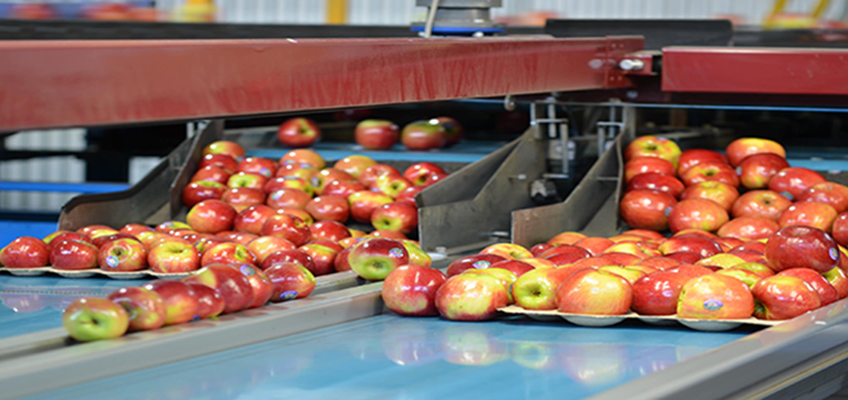If you’ve ever sunk your teeth into a juicy apple from Coles or Woolworths, there’s a good chance it was brought to you by family owned business, Montague. As the largest grower and producer of apples and stone fruit in Australia, the company delivers around 56,000 tonnes of fruit a year to major supermarkets – around 30 per cent of the retail total.
Of all the fruit distributed by Montague – including recognisable brands like Jazz, Smitten, Envy Pink Lady and Royal Gala – about 15 per cent is grown at its five orchards across Australia while the rest is grown by independent orchards.
But 70 years after it was founded, times are changing. Montague’s business model and technology infrastructure was no longer fit to deliver the growth it was looking for. Chief Information Officer Michael Foreshew saw a juicy opportunity to carve out new areas of competitive advantage.
A cold snap
As a diversified business, Montague has cold-storage facilities across Australia that make sure a variety of products get to customers in perfect condition. These have played a major role in its success but were also holding it back. Over the years, these facilities have become crucial to the development of another side of the company’s business – providing convenient refrigeration for other food companies including Patties, Bega, Saputo and Allied Mills.
New competitors and advances in technology were making it more difficult for Montague’s cold storage to compete on cost. This was a major challenge in a largely price-driven market but Foreshew saw an opportunity to reduce cost and complexity while making it easier to interact with the company.
“With all five cold storage sites having a primary and secondary server, we were using 10 servers. They were all due to be replaced and it was going to cost us a huge amount to upgrade,” he says.
“But there was also pressure to make a change because maintenance was costing up to $80,000 a year. The prediction was that continuing with our current approach we could go 10 days without being able to get back up and running.”
With systems down, loss of control over inventory’s age and the ability to bill customers meant lost revenue and possible reputational damage.
Replacing the servers would cost about $1.5 million but there was a better option – moving to Microsoft’s Azure cloud. The company avoided the upfront cost of installing new servers and spread a $240,00 ($80,000 per annum) cost over three years, improving cash flow. Effectively we replaced our maintenance cost with Azure servers and completely avoided the need to purchase equipment.
The cost savings helped Montague hold its cold-storage rates steady and increase business with existing customers. Its facilities are now about 97 per cent full.
Low-hanging fruit
Foreshew knew that customer experience could be a differentiator. He envisioned a portal that would reduce complexity and add value for fruit growers and other key partners. Based on Microsoft Sharepoint, the Montague+ portal brings the back office to the forefront. It allows partners to access information when they need it rather than relying on Montague staff.
“Our growers want to know when they’re going to get paid; we want to know how many bins of fruit they have,” Foreshew says. “They will be able log in and get or share that information right away.”
The idea was to present all the information that customers, suppliers, growers and employees need in a single interface. The dashboard changes depending on the information these different groups need.
The system’s ability to provide valuable new insights to growers was another key benefit. What began as an online fruit-tracking system to trace key information like pick dates and locations has been extended. Through a partnership with Connexxion, Montague is now able to use the system to help growers increase sales and reduce wastage by highlighting opportunities to sell fruit that’s nearing its sell-by-date. It’s a simple insight that saves them money.
It’s also resulted in greater flexibility and less time spent responding to queries for Montague staff. Many of them are mobile workers and can now spend less time at head office. Sales teams, for example, can do account management on any device wherever and whenever it suits them.
Looking ahead, Foreshew sees Montague+ changing the way the company does business. It will become the most common way for staff to communicate and share information.
“When I was in school and we were asked to do a project, we’d all go off and work individually before coming back with something quite homogeneous. Nowadays my kids are doing team-based projects,” he says. “That’s the way Montague wants to move. We see SharePoint and Montague+ as key to getting us there.”
It’s already changing how Montague communicates with its shareholders and key stakeholders like the big supermarket chains. All board documents are managed through SharePoint so there’s no need for board members to carry 500-page reports, while product images are also shared with retailers through team sites.
A good pick
Getting systems up and running on Azure went without a hitch and Foreshew expects the rest of Montague’s infrastructure will follow. Having the Microsoft name behind its technology has been reassuring for some larger customers.
“It provides a level of comfort. You can’t underestimate that,” Foreshew says. “But the biggest impact is changing how our partners measure the value of third-party logistics. It used to be all about who was cheapest but the new system strengthens our position in the market as we provide genuinely better value.”





